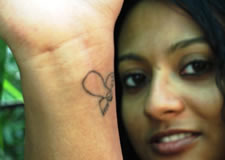Trina Talukdar (Changent/Teacher)
 When I was 18 years old, just about step into college with intention to study literature, sociology and political science, I decided I no longer wanted to be financially dependent on my parents.
When I was 18 years old, just about step into college with intention to study literature, sociology and political science, I decided I no longer wanted to be financially dependent on my parents.
I needed a job that would pay me enough to support myself. That job turned out to be teaching the children of sex workers in Kalighat, one of the oldest and largest red light areas in Kolkata, India.
It would pay me the best because no one else wanted the job. No one wanted to walk into a red light area everyday and spent 5 hours there. I took the job.
Although I least suspected it, and initially did it purely for the salary, this "job" changed my life. While teaching the children of sex workers, I interacted with a lot of their mothers- young women trafficked from rural India, Bangladesh and Nepal, many infected with AIDS, with young children.
But why I really started respecting these women was because they were strong, independent women, who carried switch blades in their bras, and knew how to protect themselves against cops and pimps alike.
My hours of conversations with these commercial sex workers led me to the realisation that by the time these women were involved in sex work for 6 months they could protect themselves, but when they were really vulnerable was when they were being trafficked from their homes- innocent village belles, with no idea where they were being taken to or what abuses awaited them.
I had, as if, found my calling. I wanted to empower women so they could protect themselves from being tricked into being sold into the sex trade- end trafficking by attacking it at its root cause. I went on to do my Masters in Social Work, specialising in Medical and Psychiatry.
During my Masters, I met Robin Chaurasiya, who had worked in anti-trafficking NGOs across India and was disillusioned by their lack of effectiveness. None of them had counseling for the Post-Traumatic Stress Disorder trafficked girls inevitabley suffered from, no educational programs for the girls, rife in money laundering.
Robin and I spoke with trafficked women, asking them how they thought trafficking should be ended before it even starts. We collated my knowledge of how the problem should be tackled and hers of how it should not, coupled it with ideas from these women, and thus Kranti was born!
Related links:
Trina Talukdar on Changents
@KrantiMumbai